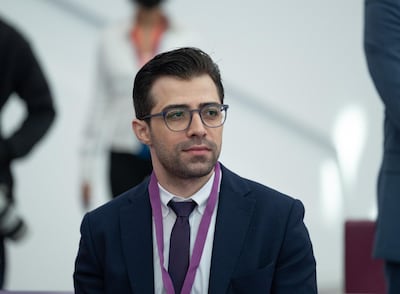A Syrian refugee has been named the winner of a global initiative to encourage Arabs to train as professional computer coders.
Mahmoud Shahoud, 32, clinched the $1 million prize after undergoing training and developing the One Million Arab Coders competition's winning software project.
A software engineer, he fled war in his home country in 2013 for Turkey.
He took advantage of the offer of free training in coding — often called the “language of the future” — after seeing the competition on Facebook in 2018.
Crown Prince of Dubai
Sheikh Hamdan bin Mohammed, Crown Prince of Dubai, congratulated Mr Shahoud and other winners at a ceremony at the Museum of the Future on Wednesday.
“Coding is the quickest way for Arab youth to achieve their dreams. Coding creates the future,” said Sheikh Hamdan on Twitter.
Six software projects developed by young Arabs from around the world competed for the grand prize of $1m for developing the most innovative coding project.
They were trained by, and partnered with, 3,600 coding tutors. Five runners-up receive $50,000 each and the four best trainers win $25,000 each.
Mr Shahoud learnt skills that helped him to develop the Habit360 smartphone application, which enables people to build better habits in their lives and track their accomplishments and feelings.
He told The National that half of his winnings would go towards helping children orphaned by the Syrian civil war.
“With the rest, I have decided to establish my tech-focused start-up in Dubai,” said Mr Shahoud, who lives in Istanbul and plans to move to Dubai soon.

“I believe God helped me win and I did expect to win this prize. God helped me to reach this point because of that promise.
“It was a great moment when they said my name. This initiative has helped lots of people around the world.”
Mr Shahoud left Syria in 2013 and moved to Jordan where he lived for eight months. He later moved to Istanbul and works remotely as a software developer for a UK company.
His app Habit360 helps people to keep track of their daily lives.
“To create new good habits or eliminate bad ones,” he said. “The goal is to reach happiness.”
His app is available on the Google Play store while he is working on the iOS version. He told his brother of his victory.
“He was super happy. All my family members are in Syria apart from my wife and 7-year-old son who are in Turkey,” he said.
The entries were evaluated by a jury of experts in coding, technology and entrepreneurship from the UAE and abroad.
Led by Dubai Future Foundation, One Million Arab Coders was launched in 2017 by Sheikh Mohammed bin Rashid, Vice President and Ruler of Dubai, to equip a million young people with the skills to succeed in the 21st century.
Sheikh Mohammed said at the time that the initiative aimed “to empower Arab youth with modern technology and its basic tool, which is programming, the language of the modern age”.
It brought together experienced trainers in software sciences and advanced technologies in the world to train participants for free from about 80 countries, who have completed five million hours of study and work, 76,000 training workshops and 100,000 capstone projects.
Three years later, Sheikh Mohammed announced a new challenge for One Million Arab Coders graduates to compete for the title of Top Coder in the Arab world.
The initiative has transformed the lives of many who participated in the initiative since its launch, such as Amin Abu Dyak from Palestine.
Three months after graduating from the One Million Arab Coders initiative, he created the Jusoor platform that provides education for pupils in the West Bank through the use of virtual reality.
Mr Abu Dyak is currently working with the UAE's Ministry of Education to develop virtual reality education projects in the country.








